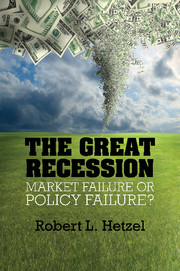Book contents
- Frontmatter
- Contents
- Figures
- Tables
- Preface
- One The 2008–2009 Recession
- Two Recessions
- Three The Great Contraction
- Four Monetary Policy and Bank Runs in the Great Depression
- Five Vigorous Recovery and Relapse
- Six Interwar International Monetary Experiments
- Seven Identifying the Shocks that Cause Recessions
- Eight From Stop-Go to the Great Moderation
- Nine Controlling Bank Risk Taking
- Ten The Housing Crash
- Eleven Bubble Trouble
- Twelve What Caused the Great Recession of 2008–2009?
- Thirteen What Caused the Great Leverage Collapse?
- Fourteen The Distinctions Between Credit, Monetary, and Liquidity Policy
- Fifteen Fed Market Interventions
- Sixteen Evaluating Policy
- Seventeen The Business Cycle
- Eighteen Why Is Learning So Hard?
- Nineteen How Should Society Regulate Capitalism?
- Postscript
- Bibliography
- Index
Nineteen - How Should Society Regulate Capitalism?
Rules versus Discretion
Published online by Cambridge University Press: 05 May 2012
- Frontmatter
- Contents
- Figures
- Tables
- Preface
- One The 2008–2009 Recession
- Two Recessions
- Three The Great Contraction
- Four Monetary Policy and Bank Runs in the Great Depression
- Five Vigorous Recovery and Relapse
- Six Interwar International Monetary Experiments
- Seven Identifying the Shocks that Cause Recessions
- Eight From Stop-Go to the Great Moderation
- Nine Controlling Bank Risk Taking
- Ten The Housing Crash
- Eleven Bubble Trouble
- Twelve What Caused the Great Recession of 2008–2009?
- Thirteen What Caused the Great Leverage Collapse?
- Fourteen The Distinctions Between Credit, Monetary, and Liquidity Policy
- Fifteen Fed Market Interventions
- Sixteen Evaluating Policy
- Seventeen The Business Cycle
- Eighteen Why Is Learning So Hard?
- Nineteen How Should Society Regulate Capitalism?
- Postscript
- Bibliography
- Index
Summary
Are competitive markets self-regulating or are they overwhelmed by market power? In the case of corporations, market power takes the form of monopolies. In the case of financial markets, it takes the form of the herd behavior of investors. As illustrated by the following quotation from the Financial Times (2009c), the 2008–2009 recession prompted a change in the intellectual climate in favor the latter market-disorder view:
The onset of the worst global recession since the 1930s has led many to suppose the era of liberal economics and light-touch financial regulation ushered in by Thatcher and Ronald Reagan is over. Failures of untrammeled capitalism are blamed for the crisis. Discredited “socialist” solutions are back: banks are nationalized or rescued with taxpayers’ funds; borrowed money is pumped into economies in a Keynesian effort to boost demand.
How should society regulate capitalism, and, as a by-product, what role should the central bank play? During the 2008–2009 recession, the United States returned to the popular ethos that existed in the Great Depression and in the Great Inflation. Namely, popular discourse held that private markets failed to discipline the self-interest of individuals in a way that causes that self-interest to redound to the public interest. Belief in the self-interest of individuals coordinated by the price system ceded before a belief in the greed of powerful players.
- Type
- Chapter
- Information
- The Great RecessionMarket Failure or Policy Failure?, pp. 342 - 345Publisher: Cambridge University PressPrint publication year: 2012

